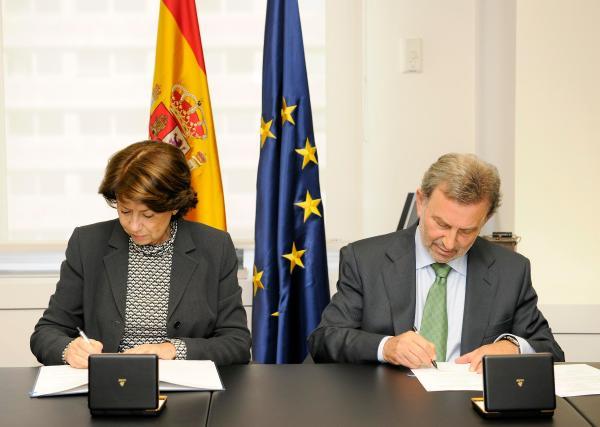
Today in Madrid, EIB Vice-President Magdalena Álvarez Arza and the Chairman of ADIF, Antonio González Marín, signed a second EUR 200 million loan instalment. The EIB will provide a total of EUR 900 million for this project.
EIB Vice-President Magdalena Álvarez underlined the “strategic importance of developing the high-speed network that will foster better rail communications between the EU regions and undoubtedly generate safety, efficiency and sustainability gains in the transport of both goods and people. This EIB loan will improve the project’s financial coverage while contributing to the achievement of the European Union’s transport objectives”.
She went on to say that “the EIB’s commitment to promoting the growth of high-speed rail is demonstrated by the three memorandums of understanding signed by the Bank, the Ministry of Public Works and ADIF to finance the expansion of the high-speed network in Spain.”
The project consists of the construction of a high-speed line between Madrid and Alicante, with a branch to Murcia. It includes the construction of Albacete, Alicante, Elche and Murcia stations. The new line is designed to encourage users to switch from road and other forms of transport to rail, with the resultant safety, comfort and time-saving benefits on journeys between Madrid and south-east Spain, and above all a positive environmental impact.
The Madrid-Alicante link forms part of the EU’s priority trans-European transport networks (TENs) and will therefore also attract EU cohesion and structural fund financing. Combined EU funding, including the EIB loan, will cover around 34% of the total investment cost.
The project is being financed under the third memorandum of understanding between the Bank, the Ministry of Public Works and ADIF, signed in 2009, which provides for financing of up to EUR 5 billion for high-speed lines in Spain.
Background information:
The European Investment Bank is the long-term financing arm of the European Union working to further European objectives. Founded in 1958, it finances projects in the 27 EU Member States and more than 130 other countries worldwide in line with EU policies. Given their key role in fostering the EU’s economic and social integration, the free movement of people and goods, and the development of the Union’s less advanced regions, financing the trans-European networks (TENs) is one of the Bank’s top priorities.

Photographer: EIB ©To be defined
Download original